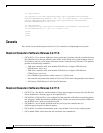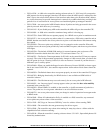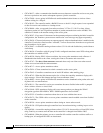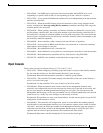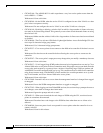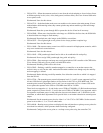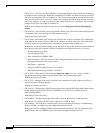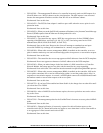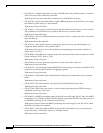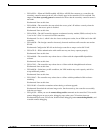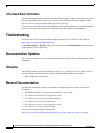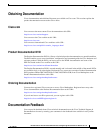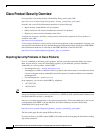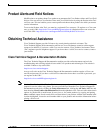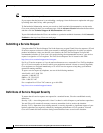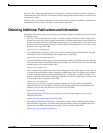
24
Release Notes for Cisco Wireless LAN Controllers and Lightweight Access Points for Release 3.2.171.6
OL-11567-02
Caveats
• CSCsd83743—Authentication fails if you enter a RADIUS-server key with more than 31 characters
on the ACS server and a 4400 series controller.
Workaround: Do not enter more than 31 characters for the RADIUS-server key.
• CSCsd93784—Setting the Channel/Power Update (RRM) parameter on the WCS does not change
the channel or power settings on the controller.
Workaround: None at this time.
• CSCse02235—Access points occasionally delay the transmission of beacons by 0.1 or 0.2 seconds.
This condition occurs when the access points do not have any associated clients.
Workaround: None at this time.
• CSCse04495—The Cisco WiSM controller may become stuck in a strange state after it is powered
down and back up.
Workaround: Reset the controller.
• CSCse04713—The controller detects a rogue access point, but it may not acknowledge it as a
“Rogue on Wired Network” access point on WCS.
Workaround: You can try to resolve this problem by downgrading your controller software to a
release prior to 3.2.78.0.
• CSCse06509—The 4400 series controller sends out an undersized frame when it connects to certain
Catalyst switches (2970, 3560, or 3750).
Workaround: None at this time.
• CSCse07836—An access point may experience a system restart after a fail over.
Workaround: None at this time.
• CSCse08725—A Vocera badge running MS-PEAP fails when trying to associate to an AP1010. This
problem occurs because the controller is dropping the packets.
Workaround: None at this time.
• CSCse09235—UDP traffic drops in both directions when per-user bandwidth is set for real-time
traffic.
Workaround: None at this time.
• CSCse15932—The 4404 controller may reboot if the TimerTickTask software fails.
Workaround: None at this time.
• CSCse17260—WPA clients may receive an error message indicating that the WEP key may be
configured incorrectly on the client.
Workaround: None at this time.
• CSCse18855—RADIUS accounting cannot be disabled on an individual WLAN. Once a RADIUS
accounting server is defined globally, WLANs fall back to the global RADIUS accounting server if
no RADIUS accounting server is selected in the WLANs.
Workaround: Create a fictitious RADIUS accounting server and assign it to the WLAN for which
RADIUS accounting is not required.
• CSCse30452—After the secondary DHCP server provides an IP address to an access point, the
access point shows “(tNetTask): arpresolve” and then reboots.
Workaround: None at this time.



